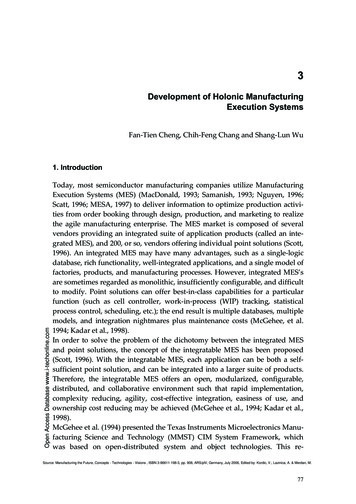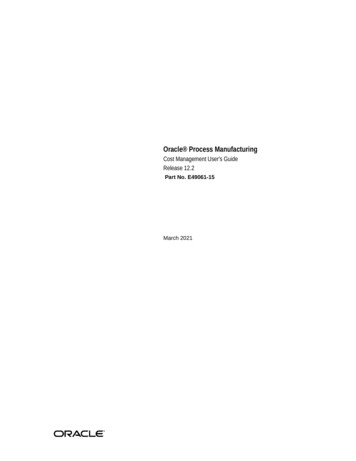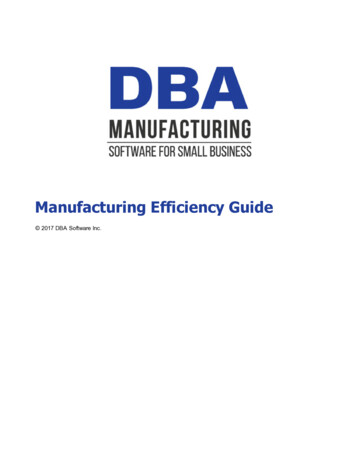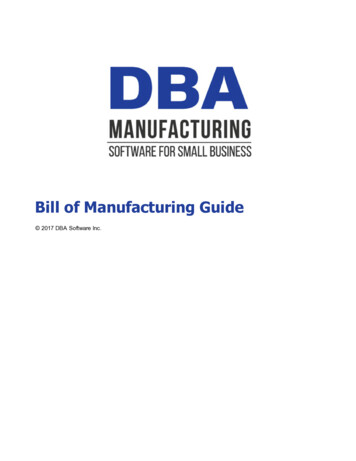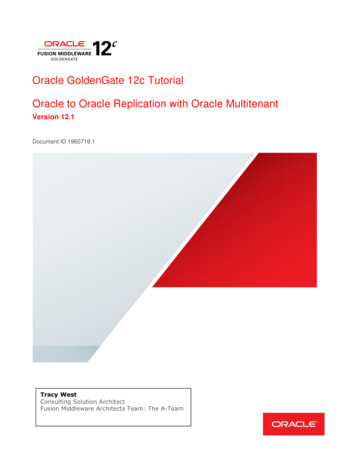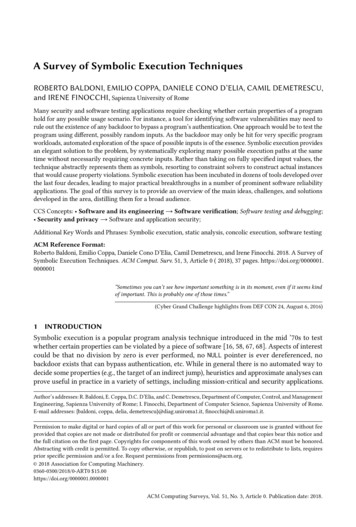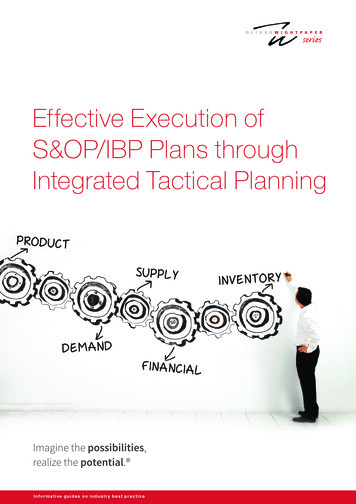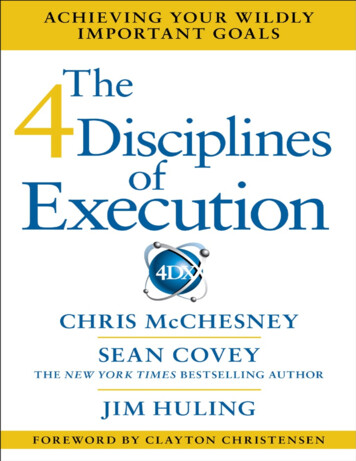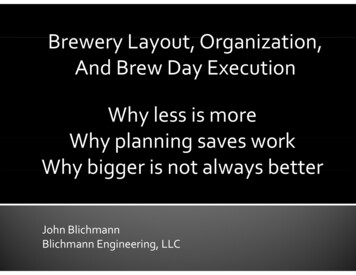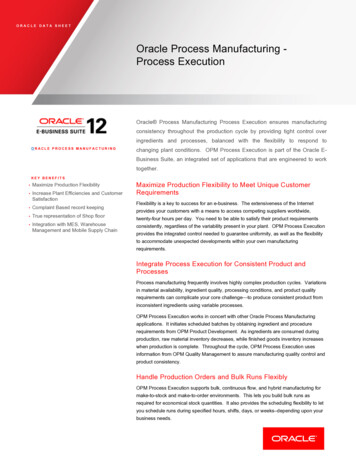
Transcription
ORACLE DATA SHEETOracle Process Manufacturing Process ExecutionOracle Process Manufacturing Process Execution ensures manufacturingconsistency throughout the production cycle by providing tight control overingredients and processes, balanced with the flexibility to respond toORACLE PROCESS MANUFACTURINGchanging plant conditions. OPM Process Execution is part of the Oracle EBusiness Suite, an integrated set of applications that are engineered to worktogether.KEY BENEFITS Maximize Production Flexibility Increase Plant Efficiencies and CustomerSatisfaction Complaint Based record keeping True representation of Shop floor Integration with MES, WarehouseManagement and Mobile Supply ChainMaximize Production Flexibility to Meet Unique CustomerRequirementsFlexibility is a key to success for an e-business. The extensiveness of the Internetprovides your customers with a means to access competing suppliers worldwide,twenty-four hours per day. You need to be able to satisfy their product requirementsconsistently, regardless of the variability present in your plant. OPM Process Executionprovides the integrated control needed to guarantee uniformity, as well as the flexibilityto accommodate unexpected developments within your own manufacturingrequirements.Integrate Process Execution for Consistent Product andProcessesProcess manufacturing frequently involves highly complex production cycles. Variationsin material availability, ingredient quality, processing conditions, and product qualityrequirements can complicate your core challenge to produce consistent product frominconsistent ingredients using variable processes.OPM Process Execution works in concert with other Oracle Process Manufacturingapplications. It initiates scheduled batches by obtaining ingredient and procedurerequirements from OPM Product Development. As ingredients are consumed duringproduction, raw material inventory decreases, while finished goods inventory increaseswhen production is complete. Throughout the cycle, OPM Process Execution usesinformation from OPM Quality Management to assure manufacturing quality control andproduct consistency.Handle Production Orders and Bulk Runs FlexiblyOPM Process Execution supports bulk, continuous flow, and hybrid manufacturing formake-to-stock and make-to-order environments. This lets you build bulk runs asrequired for economical stock quantities. It also provides the scheduling flexibility to letyou schedule runs during specified hours, shifts, days, or weeks–depending upon yourbusiness needs.
You can also scale the batches to fit production requirements. Ingredients are scaledaccording to preset fixed, proportional or integer multiple quantities to assure properbatch sizing.KEY FEATURESOracle process manufacturingprocess execution supports: Production Recipes Production Batches Batch Release Material Reservations Move Orders Electronic Recordkeeping Mobile Transactions Integration to Warehouse ManagementSystems Actionable Insights into productionbatches and production quality withprocess manufacturing command centerImprove Process Execution with Clear and DetailedFormulation DefinitionsMaintain multiple versions of recipes to make a product. By specifying the exactconditions for use of each recipe version, OPM provides the tools to enable optimal useof available materials and resources to produce consistent product.Execute Production Runs Starting with Extensive RecipeInformationOPM Process Execution begins a production run by obtaining complete recipeinformation from the recipe created in the OPM Product Development application.Process Execution lets you select the appropriate recipe for a batch.With OPM Process Execution, you can have a batch with far more than the listedingredient quantities. All information regarding co-products, byproducts, and scrap areavailable by production process. Also available is ready-to-use scalability andtheoretical yield data.With a scalable formula, you can easily increase or decrease production quantities byspecifying a new production quantity. PM Process Execution automatically scales theingredient, co-product, and by-product quantities for you. Theoretical yield informationlets you compensate for factors such as evaporation or chemical reactions that oftencause a formula to yield less than the sum of the individual ingredient quantities. OPMProcess Execution calculates and displays the expected theoretical yield percentage ofany scheduled batch. OPM Process Execution also takes input from the OPM ProductDevelopment formula cost information to create batches on a Least Cost Validity rule.Increase Plant Efficiencies and Customer Satisfaction withIntegrated Planning and Inventory ManagementAccepting customer orders that will consistently lead to satisfied customers andprofitable sales requires many factors working in concert across your business. OPMProcess Execution is integrated to relevant business flows to ensure that accurate,timely information is used in the manufacturing process.Reserve and Assess Inventory before ProductionUpon opening a run, OPM Process Execution lets you automatically or manuallyreserve specific inventory for production, according to predefined business rules. Youcan enforce inventory-handling rules such as first expired, first out (FEFO), or first in,first out (FIFO) in the midst of the production process. This guarantees the efficientuse of inventory and ensures that you always receive appropriately graded or datedmaterials for any scheduled batch.OPM Process Execution also checks inventory to ensure that you have an adequatesupply of ingredients and raw materials, and automatically notifies you of any shortages.As a result, you can decide whether to hold production orders until sufficient ingredientquantities arrive, or scale batches to reflect the constraints of available inventory. Thishelps to eliminate the inconvenience, expense, and lost productivity associated withhalting production because of unanticipated shortages.2ORACLE PROCESS MANUFACTURING PROCESS EXECUTION
Record Production Actual through Partial or Complete RunCertificationOn completion of a production run, you can run reports to show exactly which rawmaterials and ingredients were consumed, and which finished goods, co-products, byproducts, and scrap were produced. In continuous-flow production environments,incremental back flushing allows you to complete a partial quantity of a batch at aninterim production step. This is useful when production runs continuously over multipleshifts, or for more than one day.Record Production by StepIngredient usage and product yield can be planned for and recorded by production step.Planning will recognize that an ingredient that will be used in a later step in a processwill not be needed when a production run is started, but when the step in which theingredient will be used is planned to start. Similarly, planning will recognize thatproducts that are yielded at an intermediate step will be available before the entireproduction run has completed.Release Ingredients Simultaneously or IncrementallyWhen you release a run, you have the option to subtract allocated items or ingredientsfrom inventory simultaneously at the beginning of production, or incrementally asingredients are consumed. Reporting ingredient consumption incrementally allowsthose process manufacturers whose production runs may last several days to updatetheir inventory as stock is consumed. This offers an accurate, real-time view ofinventory status. OPM Process Execution inventories a released production run aswork-in-process. If you cancel a run, it automatically returns all allocated items toavailable inventory, unless otherwise directed.Streamline Inventory StagingOPM Process Execution allows configuring the shop floor with staging area and alsoenables material movement tracking by use of Move Orders. Materials could be movedfrom the Raw material inventory to the staging areas, documented and tracked by themoved orders, thereby providing complete material control of the shop floor.Facilitate Electronic Data Exchange with Standard ApplicationProgramming Interfaces (APIs)Today, integration with the shop floor has become a business necessity in the processindustries. OPM Process Execution incorporates Application Programming Interfaces(APIs) that provide easy, flexible integration with your shop floor systems. Whether yourmanufacturing is fully or partially automated, you can use APIs to achieve direct userinput into OPM screens, interfaces to specific pieces of equipment, or full integrationwith a complete manufacturing execution system (MES). Because Process Executionrepresents an out-of-the-box solution to shop floor integration, it provides a rapid returnon your investment along with the benefits of better, timelier manufacturing control.21 CFR Part 11 Compliant Electronic Recordkeeping21 CFR Part 11 represents the combined effort of divisions within the FDA, along withmembers of the pharmaceutical industry, to establish a uniform, enforceable, baselinestandard by which the FDA will consider electronic records equivalent to paper recordsand electronic signatures equivalent to traditional handwritten records and signatures.3ORACLE PROCESS MANUFACTURING PROCESS EXECUTION
In 2003, the FDA announced that it was taking a narrower interpretation of the scope ofORACLE PROCESS MANUFACTURINGRELATED PRODUCTSpart 11— focusing its efforts on assuring compliance for high-risk records. High-riskrecords are those whose integrity, or lack thereof, pose the greatest potential risks toproduct quality and consequently, public health and safety. The FDA also reaffirmedthat Part 11 was here to stay. Oracle Advanced Supply Chain Planning Oracle Order Management Oracle Procurementbusiness events in OPM Process Execution, including batch status changes during a Oracle Inventoryproduction run, and updates to quantities and allocations throughout the manufacturing Oracle Process Manufacturing Qualitycycle. Oracle Process Manufacturing ProductDevelopmentIntegration to Warehouse Management Systems Oracle MES for Process Manufacturing Oracle Electronic Records and SignaturesOracle looks to these regulations as the basis for designing the compliance solutions itoffers its customers. To that end, electronic recordkeeping is available on all criticalIn most of the shop floor operations, material consumption and yield occur in thewarehouse management system and is recorded using mobile devices. Activities suchas put away and yielding to an LPN are done directly using mobile devices. With OPMProcess Execution, you are now able to yield directly into LPN, and put away using theOracle Warehouse Management System (WMS)Oracle Process Manufacturing Command CenterThe Oracle Process Manufacturing Command Center provides dashboards empoweringproduction supervisors and quality managers with actionable insights that help managethe production operations efficiently to meet the customer commitments and resolve theproduction quality issues. With tools and visualizations such as actionable indicators,tag clouds, interactive charts, and consumer-like search and filters, users can browseand drill on whatever captures their attention, revealing new information on which tobase next discovery steps. Through this "information-driven navigation", users canquickly narrow in on priority transactions and take immediate, informed action.The Oracle Process Manufacturing Command Center is available at no additional costto licensed users of Oracle Process Manufacturing, Release 12.2.4 and aboveFigure 3: Batch Status Dashboard in Oracle Process Manufacturing Command Center4ORACLE PROCESS MANUFACTURING PROCESS EXECUTION
Oracle E-Business Suite: The Complete SolutionOracle E-Business Suite enables companies to efficiently manage customer processes,manufacture products, ship orders, collect payments, and more—all from applicationsthat are built on unified information architecture. This information architecture providesa single definition of your customers, suppliers, employees, and products—all importantaspects of your business. Whether you implement one module or the entire Suite,Oracle E-Business Suite enables you to share unified information across the enterpriseso you can make smarter decisions with better information.CONTACT USFor more information about Oracle Inventory Management, visit oracle.com or call 1.800.ORACLE1 tospeak to an Oracle representative.CONNECT WITH r.com/oracleoracle.com5Copyright 2019, Oracle and/or its affiliates. All rights reserved. This document is provided for information purposes only, and thecontents hereof are subject to change without notice. This document is not warranted to be error-free, nor subject to any otherwarranties or conditions, whether expressed orally or implied in law, including implied warranties and conditions of merchantability orfitness for a particular purpose. We specifically disclaim any liability with respect to this document, and no contractual obligations areformed either directly or indirectly by this document. This document may not be reproduced or transmitted in any form or by anymeans, electronic or mechanical, for any purpose, without our prior written permission.Oracle and Java are registered trademarks of Oracle and/or its affiliates. Other names may be trademarks of their respective owners.Intel and Intel Xeon are trademarks or registered trademarks of Intel Corporation. All SPARC trademarks are used under license andare trademarks or registered trademarks of SPARC International, Inc. AMD, Opteron, the AMD logo, and the AMD Opteron logo aretrademarks or registered trademarks of Advanced Micro Devices. UNIX is a registered trademark of The Open Group. 0519ORACLE PROCESS MANUFACTURING PROCESS EXECUTION
Oracle Process Manufacturing Command Center The Oracle Process Manufacturing Command Center provides dashboards empowering production supervisors and quality managers with actionable insights that help manage the production operations efficiently to meet the customer commitments and resolve the production quality issues. With tools and visualizations such as actionable indicators,

